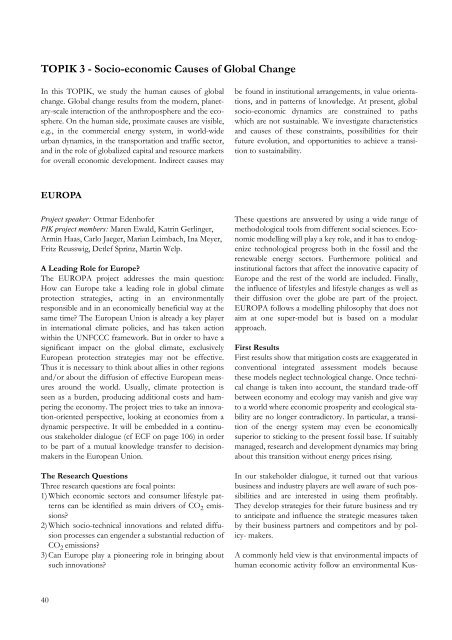PIK Biennial Report 2000-2001 - Potsdam Institute for Climate ...
PIK Biennial Report 2000-2001 - Potsdam Institute for Climate ...
PIK Biennial Report 2000-2001 - Potsdam Institute for Climate ...
You also want an ePaper? Increase the reach of your titles
YUMPU automatically turns print PDFs into web optimized ePapers that Google loves.
TO<strong>PIK</strong> 3 - Socio-economic Causes of Global Change<br />
In this TO<strong>PIK</strong>, we study the human causes of global<br />
change. Global change results from the modern, planetary-scale<br />
interaction of the anthroposphere and the ecosphere.<br />
On the human side, proximate causes are visible,<br />
e.g., in the commercial energy system, in world-wide<br />
urban dynamics, in the transportation and traffic sector,<br />
and in the role of globalized capital and resource markets<br />
<strong>for</strong> overall economic development. Indirect causes may<br />
EUROPA<br />
Project speaker: Ottmar Edenhofer<br />
<strong>PIK</strong> project members: Maren Ewald, Katrin Gerlinger,<br />
Armin Haas, Carlo Jaeger, Marian Leimbach, Ina Meyer,<br />
Fritz Reusswig, Detlef Sprinz, Martin Welp.<br />
A Leading Role <strong>for</strong> Europe?<br />
The EUROPA project addresses the main question:<br />
How can Europe take a leading role in global climate<br />
protection strategies, acting in an environmentally<br />
responsible and in an economically beneficial way at the<br />
same time? The European Union is already a key player<br />
in international climate policies, and has taken action<br />
within the UNFCCC framework. But in order to have a<br />
significant impact on the global climate, exclusively<br />
European protection strategies may not be effective.<br />
Thus it is necessary to think about allies in other regions<br />
and/or about the diffusion of effective European measures<br />
around the world. Usually, climate protection is<br />
seen as a burden, producing additional costs and hampering<br />
the economy. The project tries to take an innovation-oriented<br />
perspective, looking at economies from a<br />
dynamic perspective. It will be embedded in a continuous<br />
stakeholder dialogue (cf ECF on page 106) in order<br />
to be part of a mutual knowledge transfer to decisionmakers<br />
in the European Union.<br />
The Research Questions<br />
Three research questions are focal points:<br />
1) Which economic sectors and consumer lifestyle patterns<br />
can be identified as main drivers of CO 2 emissions?<br />
2) Which socio-technical innovations and related diffusion<br />
processes can engender a substantial reduction of<br />
CO 2 emissions?<br />
3) Can Europe play a pioneering role in bringing about<br />
such innovations?<br />
40<br />
be found in institutional arrangements, in value orientations,<br />
and in patterns of knowledge. At present, global<br />
socio-economic dynamics are constrained to paths<br />
which are not sustainable. We investigate characteristics<br />
and causes of these constraints, possibilities <strong>for</strong> their<br />
future evolution, and opportunities to achieve a transition<br />
to sustainability.<br />
These questions are answered by using a wide range of<br />
methodological tools from different social sciences. Economic<br />
modelling will play a key role, and it has to endogenize<br />
technological progress both in the fossil and the<br />
renewable energy sectors. Furthermore political and<br />
institutional factors that affect the innovative capacity of<br />
Europe and the rest of the world are included. Finally,<br />
the influence of lifestyles and lifestyle changes as well as<br />
their diffusion over the globe are part of the project.<br />
EUROPA follows a modelling philosophy that does not<br />
aim at one super-model but is based on a modular<br />
approach.<br />
First Results<br />
First results show that mitigation costs are exaggerated in<br />
conventional integrated assessment models because<br />
these models neglect technological change. Once technical<br />
change is taken into account, the standard trade-off<br />
between economy and ecology may vanish and give way<br />
to a world where economic prosperity and ecological stability<br />
are no longer contradictory. In particular, a transition<br />
of the energy system may even be economically<br />
superior to sticking to the present fossil base. If suitably<br />
managed, research and development dynamics may bring<br />
about this transition without energy prices rising.<br />
In our stakeholder dialogue, it turned out that various<br />
business and industry players are well aware of such possibilities<br />
and are interested in using them profitably.<br />
They develop strategies <strong>for</strong> their future business and try<br />
to anticipate and influence the strategic measures taken<br />
by their business partners and competitors and by policy-<br />
makers.<br />
A commonly held view is that environmental impacts of<br />
human economic activity follow an environmental Kus-

















